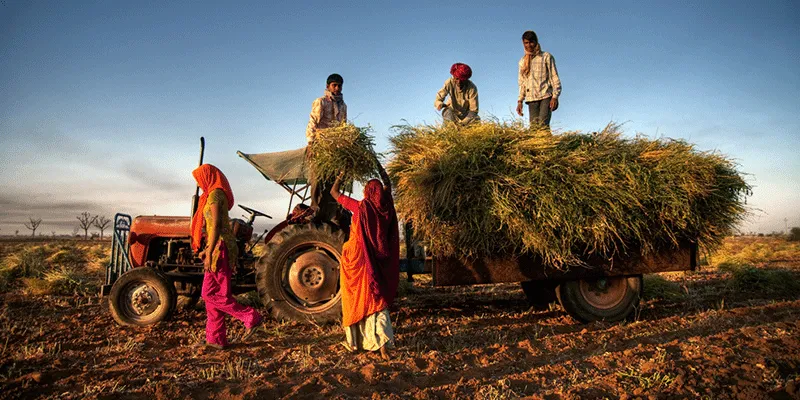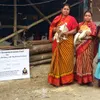Nabard doubled its assets in 5 years. How can it help farmers do the same?
As Nabard celebrates its 36th formation day, it’s time to figure out how the National Bank for Agriculture and Rural Development can improve the lot of India’s small farmers. Climate-smart asset creation and FPO financing are the way ahead.
When I say “farmer”, what words come to your mind? Poverty, suffering, suicides, political puppet… the list will go on. Harsh Kumar Bhanwala, the Chairman of Nabard, recently said Nabard would play a crucial role in changing the narrative of Indian farming, with the help of 10,000 farmer producer organisations (FPOs). He also mentioned that the total assets of Nabard doubled from Rs 254,000 crore a few years ago to Rs 487,000 crores at present, and that the same are likely to double again in five years from now.

As Nabard celebrates its 36th formation day today, we need to ask three tough questions:
1) Why do we not have any reasonable roadmap that the Indian farmer’s income will be doubled in the next five years?
2) When climate change is real and is affecting farmers so terribly, why is the focus not on asset creation to counter climate change?
3) When FPOs are the silver bullet we are betting on, then why does RBI not have a financing policy on the same to support FPO financing?
Doubling farmers’ income
I am not focusing on just building a narrative, but a concrete action plan. Let’s admit: we do not have one. However, Modi 2.0 has set up a committee of chief ministers to transform the Indian agriculture and food sector. When we want to double farmer’s income, we need a three-dimensional approach:
* Increase the profits of a smallholder farmer to ensure that they earn at least Rs 1 lakh per household annually
* Reduce income variability caused due to climate risk and distribution challenges
* Improve regularity of income
This is a paradigm shift from what policymakers currently do. It is not just increasing incomes once; it is about having the ability to increase them in a sustainable manner, by insulating them from climate risks like drought, heat and others. That requires climate-smart asset creation for farmers, which brings us to the second aspect.
Climate-smart asset creation
If we consider salary data of an employee over five years, you find that it generally increases over time. Unfortunately, the story of the Indian farmer is different. A central government study showed that farmers lose money on a five-year average. Even if they make money in one year, they lose in the subsequent periods, making farming a zero sum game. One of the main reasons for this is lack of climate protection for what they grow.
This problem cannot be solved with direct beneficiary transfers, as it gets used up for revenue expenditures to run the family and in repaying loans from informal sources. So, Nabard and the government should focus on creating a strategy to make every farm in India climate-smart over the next 10 years. This means much more than just providing internet to villages. It requires research on “what level of climate-smart protection is needed for each crop to do better than what it is doing today”. At Kheyti, we started doing this. Such assets need to be made available and accessible to smallholder farmers, not as a subsidy, but on “pay-as-you-grow model”. When a phone worth Rs 50,000 is given at a subsidised price of Rs 5,000, we tend to drop it more frequently. The same happens when farmers are given assets on subsidies.
This requires a new kind of financing, which aligns the incentives of everyone involved. I call this “sustainable flexi financing”. If farmers get Rs 10,000 gain from farming, they pay Rs 5,000. If they get Rs 8,000, then they pay Rs 4,000. FPOs can be used as a vehicle to creating this revolutionary way of financing. This pushes everyone into the ecosystem, right from banks, to focus on farmers making money, rather than stopping at lending. The flexibility that the government and Nabard has in giving grants should be used as a leverage to create right behaviour in farmers to make them work and prosper with a climate-smart asset like micro irrigation, shade nets, greenhouses etc., This brings me to the last aspect: when will this become a financing priority for banks?
FPO financing: more noise, less lending
While Harsh Kumar Bhanwala talks about formation of 10,000 FPOs, the main question is who will lend money to them? We have something to learn from one of our successes in the past, the self-help groups (SHG) Movement. SHGs caught up in a big way when the Reserve Bank of India (RBI) issued a financing policy to commercial banks on ways to finance SHGs. In fact, there is a State Level Bankers Committee (SLBC)-level standing committee on SHGs reviewing their financing, identifying challenges on a regular basis, and resolving them. We do not have any such mechanism for FPOs and Nabard should impress upon to RBI act on this.
Why is this important?
Being a chartered accountant and having floated a farmer producer company, I know how difficult it is for us to get financing. The lens that banks use to look at FPO financing proposals is extremely conventional and inconsistent, even though the Small Farmer Agri Consortium offers guarantee on these loans. They insist on positive net worth and profitability as a pre-requisite for funding. Also, some banks insist on urban property as collateral for financing rural farmers in agriculture. Simply put, the FPO financing policy in the current state doesn’t move the needle forward, unless the RBI acts and gets a clear policy that understands the sensitivities and realities of FPOs. Nabard should spearhead this transformation.
But why put this responsibility on Nabard?
Big challenges can be given only to top performers. There is no question that Nabard has been one of the most honest and farmer-focused organisations in the country. It has a network that can reach any part of the country. It has total assets, which are almost one-fifth of India’s annual budget. It’s not just Nabard, we all need to be a part of the change that we want to see in the lives of smallholder farmers. I dream of an India where Indian farmers thrive, not just survive.
Can Nabard make "flexi-climate-smart financing" the theme for this year? I wish it does.
(Disclaimer: The views and opinions expressed in this article are those of the author and do not necessarily reflect the views of YourStory.)
(Edited by Teja Lele Desai)









